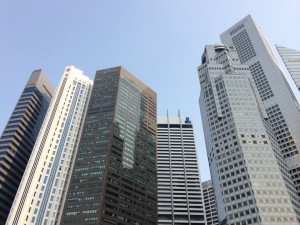 The Singapore Story: Four key things Lee Kuan Yew Got Right
The Singapore Story: Four key things Lee Kuan Yew Got Right
By David Lim for CFO Magazine
Just recently, Singapore lost its first Prime Minister, Lee Kuan Yew. Though retired from the Singapore Cabinet since 2011, the enormous influence Lee Kuan Yew, or LKY as he was often referred to, led to massive national mourning over seven days and unprecedented days of mourning in foreign capitals. Narendra Modi attended the funeral and India lowered its flag to half-mast and declared a day of mourning, as did New Zealand and the Kingdom of Bhutan. So what is it that LKY did so right as to win such respect from other nations and his own people to deserve such a reaction? Over two parts, I’ll be exploring what LKY got right as a political leader, and then what he got wrong.
Understand the context of the nascent city-state of Singapore that first obtained partial self-rule in the mid 1950s in the turbulent colonial days. Riots, political rallies, communist infiltration was all part of the picture as various parties jostled for influence and power. LKY’s People’s Action Party (PAP) was once the Opposition, and then a successful party in winning the 1959 general elections. Since independent Singapore’s painful birthing in 1965, after a dalliance with merger with the larger, also newly independent Malaysia to the north, LKY drew upon his relatively unchallenged position to create the state that with which we are familiar today. How he got things right is a lesson for any leader, but especially so for political leaders.
1) Multiracialism – if he hadn’t understood diversity by then, he understood it by the time the Singapore flag and the national pledge was created. True, he held a number of personal prejudices that got aired in public from time to time, and which offended some of Singapore’s minority races, like the Malays. But he understood that he needed to create a state where you were judged by your ability to perform, and thus promulgated one of the unspoken ideologies of the PAP, and that was that Singapore was a country based on meritocracy. If any races did not have a great start in post-independence Singapore, various self-help groups would be created to disburse a variety of social and educational help to members of that race. This avoided the communal politics which governed Malaysia then and which still does. Malaysia is a much more difficult state to govern, with political positions, favors and resources needing to be allocated based on race rather than on performance. Singapore has also avoided some of the worse communal violence that still rears its head in Asia
2) Strong state mechanisms – through meritocracy, education, and zero tolerance for corruption, LKY built a Singapore that had strong state mechanisms that governed finance, education and national development. The unwritten social compact from the 1960s to the 1970s was that people were to trust that the government they had elected was working in their interests, even if it meant forcing down peoples throats certain unpopular, but essential policies. Singapore’s 90% home ownership (the world’s highest) is not only a huge success; it means everyone has a stake in the nation. It has reserves the envy of many sovereign wealth funds. These steps helped lift thousands out from relative poverty and squalor of shantytowns, and helped improve infant mortality rates and overall health. In short, LKY dictated that the betterment of Singapore would be his lifelong priority. And you trifled with this at your own peril. Powerful state mechanisms also allowed for the creation of draconian law and order rules, as well as legislation for controlling the media to prevent it ever becoming the 4th estate that could challenge the primacy of the Executive
3) Economic advancement without ideologies – if there was one unwritten ideology of the ruling PAP, it was that they had no ideology to follow. Rather, LKY preferred strategic pragmatism. Singapore was surrounded by potentially hostile, and at least for a time in the mid -1960s, and outright hostile Indonesia, the 4th most populous country in the world. It was impractical to build a tiny nation without forming alliances of convenience and of strategic importance; or adhering to any kind of political ideology. Dr Albert Winsemius, Singapore’s UN-appointed economic advisor, and LKY’s economic supremo, Goh Keng Swee, began to create a nation that welcomed foreign investment, when many in left-leaning postcolonial Asia were suspicious of capitalists. They formed one of the earliest industrial parks in the west of the island, and developed educational policies to support what was needed at the time, and astute enough to keep changing the educational. This included but was not limited to making English the main commercial and educational language, and replacing the hodge podge collection of Chinese dialects with Mandarin in schools, and in radio and television programming. As Singapore began to climb out from labour intensive fields into more high-tech demands of multinational corporations, educational curriculum moved with the times. Today, half of the economy is propelled by MNCs based here for research, manufacturing or services
4) Making small states relevant: just as LKY preferred to be feared and respected rather than loved, he wanted Singapore to survive, and the only way was to make it relevant as a city state to much larger powers in the region, and to the superpowers. And he did this by allowing Singapore to be an intersection of global trade, a platform of geo-political ideas championing small states, and by creating a powerful defence force. Its air force is the most powerful in the region and its combined forces capabilities the best. In this respect, LKY’s legacy allows Singapore have sustainable political relevance, an anomaly in a world that favours larger states.
